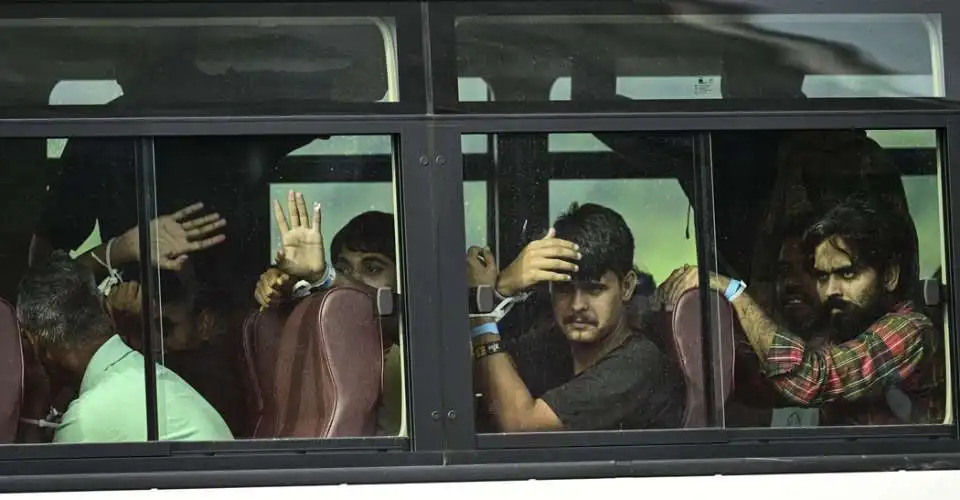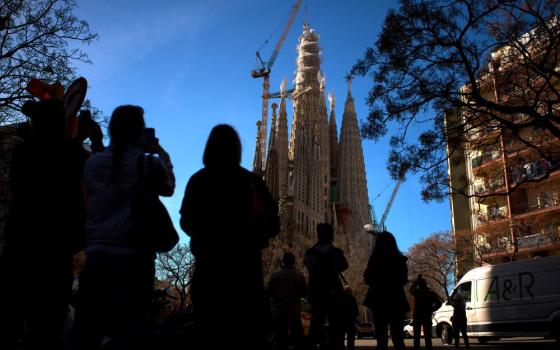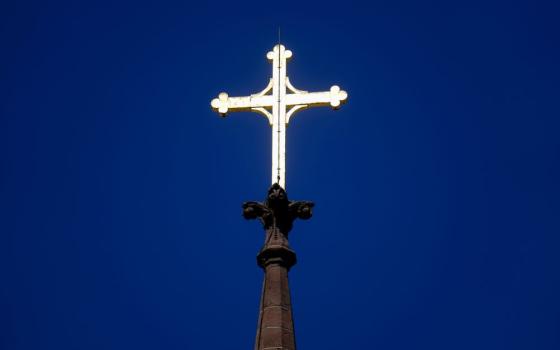
Indian migrants, with their hands handcuffed, sit on a bus as they arrive at Panamá Pacífico International Airport in Veracruz, Panama, on Sept. 6, 2024, during their deportation. Panama deported 130 Indian migrants with criminal records who entered the country through the inhospitable Darien jungle, bordering Colombia, as part of an agreement signed with the United States. (AFP)
In an era where migrants are being vilified, Catholic nuns across congregations throughout Asia are coming together to walk with them to fight for their rights and protect them.
Catholic Sisters in Asia, an umbrella group of congregations across the region, including the Sisters of Providence and the Australian Catholic Religious Against Trafficking in Humans (ACRATH), is fighting to protect those forced to leave their homes by economic hardship or human trafficking.
"The times we live in demand action. Not just empathy, but action that is translated into justice," said Sr. Rani Rani Punnaserril, a member of the Sisters of the Holy Cross Menzinge during a webinar called "Walking With Migrants" last week, hosted by the Catholic Sisters in Asia.
Rani is the secretary of the Commission for Migrants for Delhi and the northern region of India for the Conference of Catholic Bishops of India.
"It is about becoming partners with the poor, listening and advocating for them," she said.
"The legacy calls us to where the cries are the loudest and dignity is most threatened."
The United Nations High Commissioner for Refugees (UNHCR) says 123 million people have been forced to flee their homes globally due to persecution, conflict, violence, human rights violations, or "events seriously disturbing public order," as of the end of last year.
There are also 4.4 million stateless people, who have been denied a nationality and lack access to fundamental rights such as education, health care, employment and freedom of movement.
That number of 123 million ranks with Japan as the 11th largest population in the world — well ahead of countries such as Germany (84 million), the Philippines (118 million and Vietnam (100 million).
And it is more than three times the population of California, the most populous state in the US.
"Let me begin by sharing a moment that pierced my heart during the first wave of the COVID-19 pandemic," Rani told the webinar.
"I had received a desperate, frantic phone call from a frightened worker from Rajasthan," she said, referring to the western desert state in India.
"In a trembling voice, he pleaded, ‘Sister, please save us. My children haven’t eaten for two days. We will die not from the virus, but from hunger.
"That moment remains etched in my soul, not only as a call for food but as a cry for justice.
"It was for me, the voice of God speaking through the poor."
The Migrant Ministry of the Catholic Sisters in Asia plays a crucial role in addressing these issues and seeking solutions.
"It is not just about migrants," says Rani. "It is about our humanity. Walking with Migrants is not a task. It is a grace. If we dare to journey with them, we will be transformed.
Advertisement
"Let us keep working together as pilgrims of hope, lighting our way for a world where no one is forgotten and everyone belongs."
The issues of people being forced from their homes and countries by economic necessity or human trafficking have become a global crisis that cannot be ignored, says Sr. Nathalie Becquart.
Becquart was appointed by Pope Francis as an under-secretary of the Synod of Bishops in 2021, making her the first woman to hold this position and the first woman with voting rights in the Synod.
"We can’t consider any church as just the local people anymore, because there are migrants everywhere," she said.
"We have to embrace our origins. To build bridges between old and new worlds.
"When you give to the migrants, you also receive from them. Everybody has something to give."
A contributor to the webinar, who identified only as Margaret, made a veiled reference to US President Donald Trump and his anti-immigration stance.
"We need to talk about why this migration must continue, why people are forced to leave their countries," she said.
"And yes, I am speaking from the United States, as you have seen how ugly our officials have become.
"Migrants and local residents carry invisible burdens, full of anxieties … and maybe feel even deeply aggrieved."
On a rainy night in the Cambodian capital, Phnom Penh, a maid from Myanmar watched the webinar.
"This is so true. This is how I feel!" Thiri told UCA News.
"I don’t want to be here. But my family needs money. What can I do? I am forced to be here.
I miss my family, but I have no choice. There is no work for me [in Myanmar]. I am trapped [here]."
Technology has introduced a new threat: scam factories that can be set up instantly anywhere to exploit vulnerable individuals desperate for work to support their families.
These factories are swindling millions of people around the world out of billions of dollars.
The late Francis spoke out strongly for the rights of migrants, targeting the US under Trump.
"The rightly formed conscience cannot fail to make a critical judgment and express its disagreement with any measure that tacitly or explicitly identifies the illegal status of some migrants with criminality," he said in an appeal to US bishops in February, two months before his death.
People of goodwill should not give in to "narratives" that discriminate against and cause unnecessary suffering to migrants and refugees, he added.
Says Rani: "Let us keep working together as pilgrims of hope, lighting our way for a world where no one is forgotten and everyone belongs."




